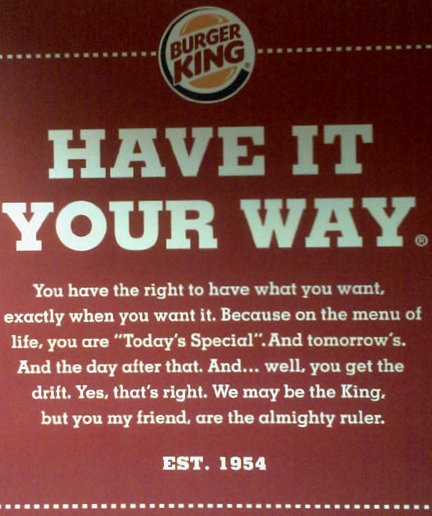Rights or gifts?

I pulled up to the Burger King drive-thru window, paid my tab, thanked the woman for her work, and pulled the small bag of food into my car. Once I began to unwrap the chicken sandwich, I noticed the brand marketing printed on the thin, grease-resistant paper. “You have the right to have things your way,” it read. “The right to a sandwich just how you want it. The right to eat it fast. The right to eat it slow. The right to start your own sandwich etiquette school. The right to have a one-man sandwich eating contest.”
Only in America is one reminded of one’s right to eat a chicken sandwich. We love the language of rights. This is the land of Daniel Boone and Davy Crockett, after all, where nobody is going to tell us what we can and cannot do. The Constitution protects our self-determination. Individual rights, when pressed to their extreme, allow us to be accountable only to ourselves.
Read our latest issue or browse back issues.
When I write about gun violence, it seems I hear first from critics. Even personal friends within my congregation appear convinced that I am out to abolish “their” Second Amendment rights. “Pastor, why don’t you leave the gun debate to politicians?” one friend wrote recently. “You need to spend your intellect and energy promoting defense of our Christian beliefs and our God-given rights.” I didn’t have the gumption to send this friend the New Yorker cartoon with God interviewing individuals lined up at the check-in podium outside the pearly gates. When a man steps up with a gun strapped to his hip, God leans over to say, “Trust me. It’s not a God-given right.”
Rights are beautiful. Where would we be without them? Take a look at the majesty of the Universal Declaration of Human Rights (1948) if you doubt their value. It’s only when we elevate certain rights to idolatrous status—a small “g” god, as seems fashionable with the Second Amendment right now—that we run into problems. Conversation ends. There’s no space to talk about vulnerable people in dangerous neighborhoods who are afraid to sit near a front window in their own home. Forced to duck bullets and live in interior rooms, they’re searching for the inalienable rights of life, liberty, and the pursuit of happiness, and not finding much.
Here’s the deal: If society is built only on the notion that we possess rights given to us at birth, why bother to express thanks? Gratitude becomes completely superfluous when life is viewed as entitlement instead of gift. Why feel gratitude or a deep sense of obligation to others if you have only received what you deserve?
Henri Nouwen gained an important insight while traveling in Latin America. “We people of the first world emphasize our rights. We claim our right to food, health, shelter, and education. [We] relate to the goods of life as possessions that are ours and [that] need to be conquered . . . and defended. Although the poor in the third world do not deny that they have basic human rights, their emphasis is on the giftedness of life . . . The goods that come to them are experienced as free gifts of God . . . gifts to be grateful for and to celebrate.”
Viewing life as a splendid gift of God means letting go of the relentless individualism that fosters our obsession with rights.






